Payments 2022. The first summary of the September PLUS-Forum
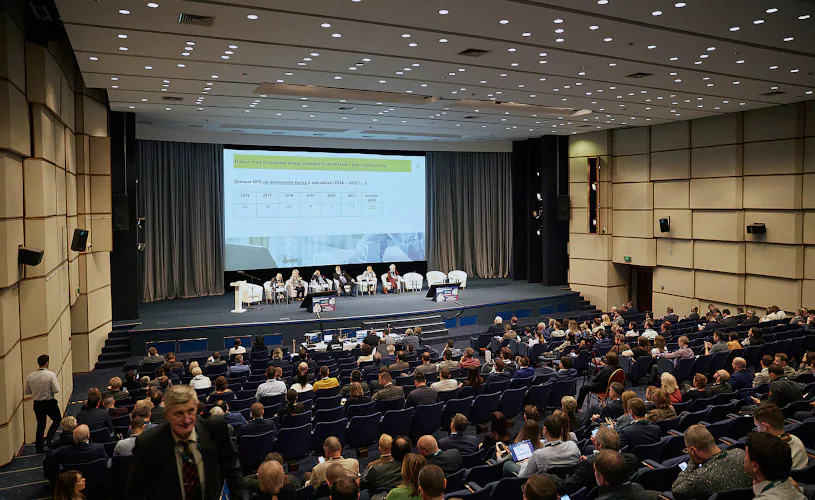
The participants of the two-day event discussed the most pressing issues of the banking business and the payment industry, remote banking, retail, e-commerce, interaction between banking and retail, as well as many other topical subjects.
Over 1500 delegates visited the PLUS-Forum during two days of its work! More than 100 speakers, well-known experts and opinion leaders in the financial industry took part in the business programme of the Forum, which is also a significant factor confirming the relevance of our business agenda.
Sponsors and partners of the 12th International PLUS-Forum “Payments”:
• NSPK - National Sponsor
• QIWI - General Sponsor
• Paygine, Fido-Bizness, ATOL, VK Tech, BPS Innovative software solutions – Chief Sponsors
• OSTCARD, Morefun, Wuhan Tianyu Information Industry Co., Ltd., ART Bank, All loans online, I Simple Lab, Waves Enterprise, Orenkart, Kontur, Benefit, ATM Service — Forum Partners
During two days, representatives of the Bank of Russia, heads of key government agencies, top managers of payment systems, banks, major retailers, IT companies, hardware and software vendors were discussing the most important issues of the current state of the market. In parallel, over 50 companies fr om more than 10 countries, including China, South Korea, and Turkey, were presenting their products, solutions, technologies and services at the Forum exhibition. Each exhibitor is a headliner in its economic niche, contributing significantly to the payments industry development.
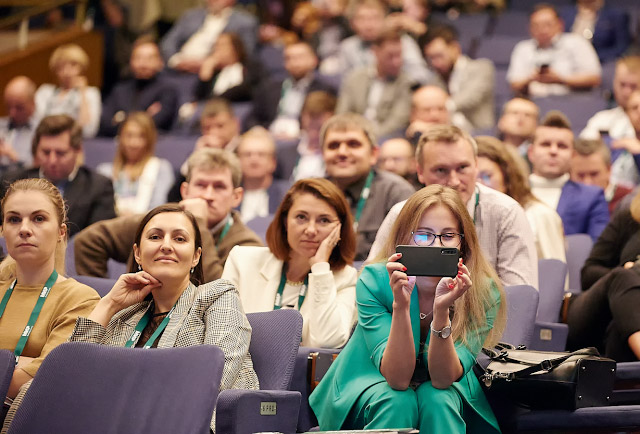
High spots of the PLUS-Forum “Payments”
Opening the first session of the Forum, NAFI Executive Director Lyudmila Spiridonova made a presentation to analyze how the payment behavior of Russians has changed in the new socio-economic reality. She mentioned a drop in the share of non-cash payments to 68% in March 2022 compared to 72% in January. The demand for cash was most likely driven by problems with non-cash payments for goods and services in April 2022, when 33% of Russians encountered such kind of difficulties.
This rather important topic was covered in the report by Madina Kalimullina, senior researcher at the HSE-Skolkovo Institute for Law and Development, National Research University Higher School of Economics; Executive Secretary of the Russian Association of Islamic Finance Experts. The importance of this topic can hardly be overestimated, given that the global Islamic finance assets are estimated at $3.6 trillion with a growth rate of 7.8% reported in 2021. Meanwhile, Russia is among the five largest exporters of products to the OIC countries. Also, Islamic finance is quite well-developed in terms of technology: the estimated capacity of Islamic fintech, represented by about 250 companies, is $50 billion now to reach projected $128 billion by 2025.
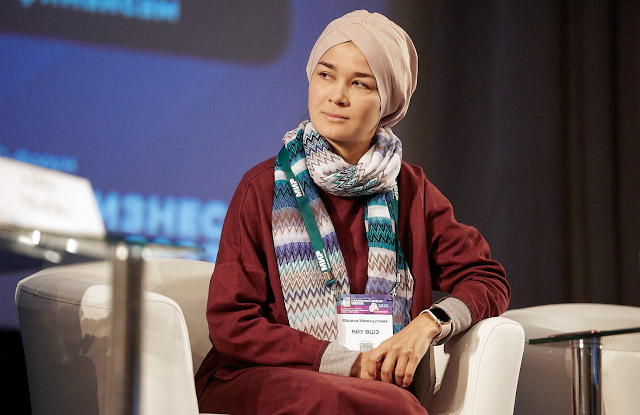
The importance of fostering non-resource exports of SMEs for the purpose of the economic development of the country in the current conditions was noted by Alexey Nikitin, director of the Single Window project and payment technologies of the Russian Export Center. In this context, he informed about the Single Window information system, which ensures effective electronic interaction of foreign trade participants with the RF government authorities, bodies and agents of foreign exchange control, and other organizations, in order to provide public services and exercise state supervision.
Currently, the main tool for payments between individuals is SBP (65 million users). The system is getting even more popular as a payment instrument in settlements between the households and businesses (25 million users). This fact was emphasized by Dmitry Kolesnikov, Head of Innovative Services Development at NSPK (National Payment Card System), whose report was focused on the development of the Faster Payment System (SBP). The popularity of the SBP among users is evidenced by statistics: the system processed about 650 million transactions in Q2 2022 alone.
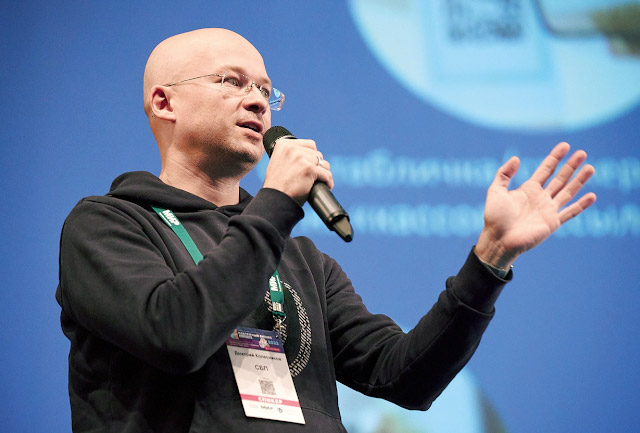
SBP is also available on ATOL PAY, a universal payment platform, which also offers acquiring solutions and its own smart terminals (ATOL RT 5, ATOL STB 5, etc.). ATOL PAY CEO Vladimir Kanin pointed out the growing popularity of smart terminals that are replacing traditional POS terminals: the market share of smart terminals has doubled over the year (from 10% to 20%). The growing popularity of smart terminals can be explained simply: those are more advanced devices offering various integrated methods for payments for goods and services.
Integration of payment solutions in the current environment is an urgent need, in particular, after the departure of some popular payment applications from Russia, Paygine Product Director Roman Tikhonov noted. He named the existing offline payment methods (cash, bank cards, transfers between individuals, SBP, SBPay, Mir Pay, etc.) and presented Method, a payment solution developed by the company. The solution does not require any payment application pre-installed on the smartphone or a bank card in hand. You just need to scan the QR code at the checkout, and the Method will prompt you to choose a payment method using SBP, Yandex Pay, Samsung Pay or saved bank cards.
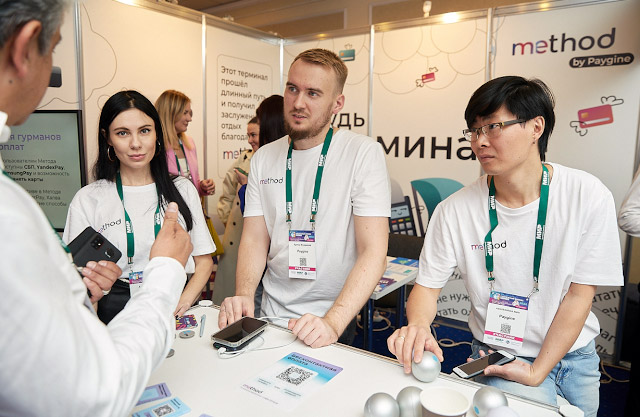
The standpoint of BPS Innovative Software Solutions, a Russian software developer, was presented by Dmitry Bubnov, the CEO of the company that has been specializing in software development for the financial, corporate and public sectors for many years. BPS Innovative Software Solutions is registered in the Russian Federation, included in the list of accredited organizations of the Ministry of Digital Development, Telecommunications and Mass Media of the Russian Federation and offers Russian-language support to its customers.
One of the core activities of the FinTech Association is the management of open data and ecosystems (open APIs), said Yulia Nosenko, Head of Open Data and Ecosystems Development. Today, the FinTech Association (AFT) is a platform for the dialogue and interaction of all parties concerned in order to develop digital financial services and technologies based on Russian solutions. In collaboration with key players in the financial industry, AFT develops open API standards and launches pilot projects to test them. For example, several AFT participants are implementing the functionality of a personal financial assistant. This solution allows managing all customer accounts in various banks through a single window and receiving aggregated analytics. Joint development of other standards, as well as open API specifications for the insurance and investment sectors, is slated for 2023.
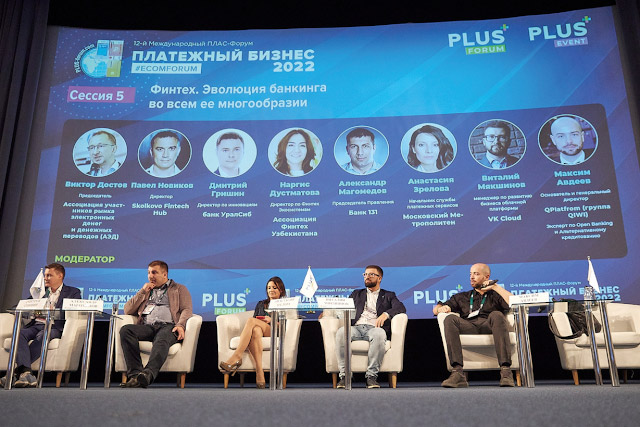
The advantages of open ecosystems were also discussed by Talkbank Founder and CEO Mikhail Popov. He believes that the open banking solutions can help partners to combine products and services, providing standard solutions, thereby increasing the attractiveness of their offering in the market. Fintech partners, working in a certain niche, develop a complex product, meeting customers’ demand for it in full. The key point is that developing a proprietary in-house solution is a long and expensive process, while ready-made solutions from fintech partners are an easier and more profitable way.
Alexey Kolesnikov, Head of Sales at iSimpleLab, presented an inexpensive and efficient solution for effective communication with clients. The iSimpleMessageGate software product allows you to manage messaging via PUSH, Telegram, Viber, SMS channels to iOS and Android mobile applications.
The currently topical issue of digital assets (DFA) was touched upon by Sergey Ryabov, Business Development Director at Masterchain. He noted the attractiveness of DFAs for issuers because of the issuance process simplicity, fast placement and quick decision making as regards the approval of issuing and amounts of fees. For investors, DFAs may be of interest as an alternative investment tool for the purpose of diversification, while banks, organizers of exchange trading, as well as any other legal entity can become intermediaries in the market (exchange operators).
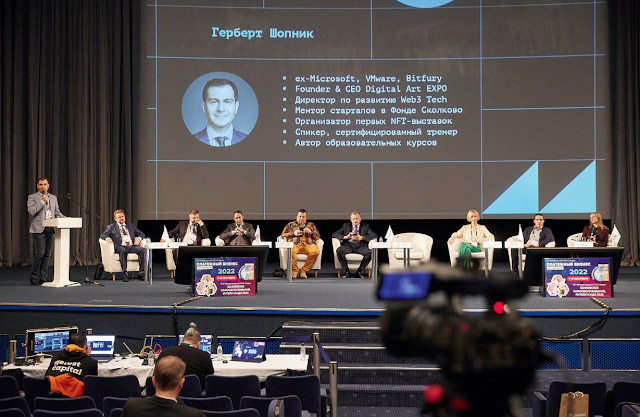
In continuation of the ВFA theme, Sergey Popov, Director of Sberbank’s Transactional Business Division, mentioned the interesting opportunities that the digitalization of assets opens up, namely the colouring of digital currency and expenditure control based on smart contracts. Colouring refers to the assignment of legitimate types of payments that can be made using digital currencies.
Herbert Shopnik, Founder of the Digital Art NFT agency, spoke about the usage of non-fungible tokens (NFT) and how this market functions. The speaker believes that NFTs, in principle, can be issued for any object, by an organization or other user, based on a distributed ledger. NFT can be transferred to a new owner or sold on the market, if the token mechanics so envisage. Herbert Shopnik noted the high NFT market growth rates: with the market capitalization ranging from $20 billion to $40 billion in 2021, it is expected to reach $240 billion by 2030. Nevertheless, he noted that the NFT market can be on the verge of a cyclical downturn now, with the stabilization and moderate and harmonious growth to follow.
The Forum also featured round tables, wh ere experts discussed the necessary measures to increase the attractiveness and security of Russian infrastructure systems, the potential of new strategies as regards collaborations in the financial industry, contactless payment technologies and tokenization of customer accounts, as well as a number of other topics.
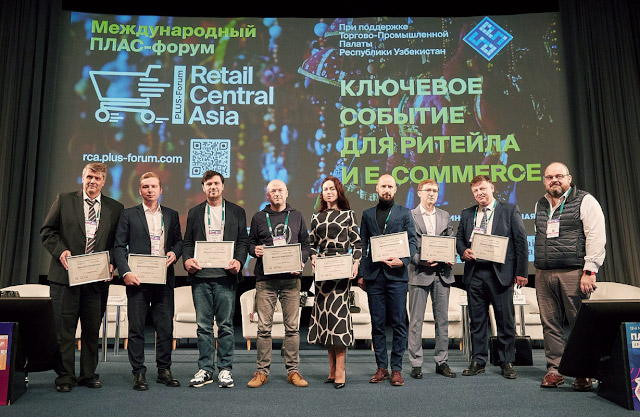
The list of participants in the discussions on the above mentioned and other topics includes Timur Aitov, Cand. Sc. (Physics and Mathematics), Deputy Chairman of the Commission on Digital Financial Technologies of the Council of the RF Chamber of Commerce and Industry; Elena Petrova, Deputy Board Chairman, Russian Standard Bank; Sergey Putyatinsky, Deputy Board Chairman, Credit Bank of Moscow; Vladimir Bakin, CFO, Wildberries; Sergey Khromov, Vice President and Head of Tinkoff Checkout.
